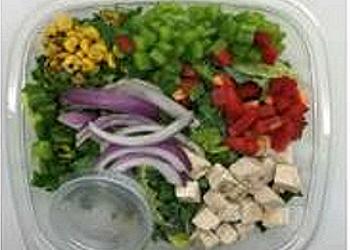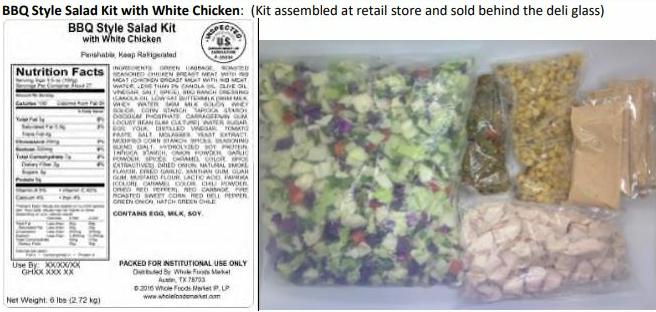
WASHINGTON, DC, October 19, 2018 (ENS) – GHSW, LLC, a Houston, Texas establishment, is recalling nearly two tons of ready-to-eat salad with chicken that contain a corn ingredient that may be contaminated with Salmonella and Listeria, the U.S. Department of Agriculture’s Food Safety and Inspection Service, FSIS, announced today.

The 1,786 pounds of ready-to-eat salads with chicken were produced from October 1 through October 18, 2018. They were on sale at two market chains usually considered to be health food stores, Whole Foods Markets and Trader Joe’s.
The recalled items were originally shipped to retail locations in Colorado, Louisiana, New Mexico, Oklahoma, Tennessee and Texas.
The products subject to recall bear establishment number “P-44056” inside the USDA mark of inspection.
The following products are subject to recall:
- 10-oz. plastic tray packages containing “365 BY WHOLE FOODS MARKET BBQ STYLE CHOPPED SALAD WITH CHICKEN” with “Best if Sold By” dates of 10/18/18 through 10/21/18 (inclusive).
- 8-oz. plastic tray packages containing “365 BY WHOLE FOODS MARKET CHICKEN FAJITA SALAD” with “Best if Sold By” dates of 10/18/18 through 10/21/18 (inclusive).
- 13-oz. plastic tray packages containing “TRADER JOE’S BBQ SEASONED WHITE CHICKEN SALAD” with “Best By” dates of 10/18/18, 10/19/18 and 10/20/18.
- 10.7-oz. plastic tray packages containing “TRADER JOE’S FIELD FRESH CHOPPED SALAD WITH GRILLED WHITE CHICKEN” with “Best By” dates of 10/18/18, 10/19/18 and 10/20/18.
- 10.7-oz. plastic tray packages containing “TRADER JOSÉ’S MEXICALI INSPIRED SALAD WITH CHILI SEASONED CHICKEN” with “Best By” dates of 10/18/18, 10/19/18 and 10/20/18.
The problem was discovered on October 15, when GHSW, LLC received notification that the corn used in the production of their ready-to-eat salad products was being recalled by their corn supplier due to Listeria monocytogenes and Salmonella concerns.
There have been no confirmed reports of adverse reactions due to consumption of these products, says FSIS.
Trader Joe’s says all of the potentially affected products have been removed from sale and destroyed. The store urges customers who bought these products to discard them or return them to any Trader Joe’s for a full refund.
In addition, Caito Foods, LLC, an Indianapolis, Ind. establishment, is recalling 1,532 pounds of ready-to-eat salad and bowl products made with chicken that contain a corn ingredient that may be contaminated with Salmonella and Listeria monocytogenes, the FSIS announced today.
The ready-to-eat salads and bowls made with chicken were produced from Oct. 6, 2018, through Oct. 14, 2018. The following products are subject to recall:
- 11.5-oz. plastic clamshell packages containing “good & deLISH sante fe style salad with chicken,” with “ENJOY BY” dates of 10/13/18 through 10/21/18 (inclusive).
- 8.75-oz. plastic clamshell packages containing “Santa Fe Style Salad with Chicken,” with “Sell By” date of 10/13/18 through 10/21/18 (inclusive).
- 11.25-oz. plastic clamshell packages containing “FRESH Garden HIGHWAY SALADS SANTA FE STYLE SALAD WITH CHICKEN,” with “Best If Sold By” dates of 10/12/18 through 10/20/18 (inclusive).
- 12-oz. plastic bowl packages containing “good to go! Chipotle Chicken Bowl,” with “Sell By” dates of 10/11/18 through 10/19/18 (inclusive).
- 8.75-oz. plastic clamshell packages containing “FRESH Garden HIGHWAY Santa Fe Style Salad with Chicken,” with “Best if Sold By” dates of 10/13/18 through 10/21/18 (inclusive).
The products subject to recall bear establishment number “P-39985” inside the USDA mark of inspection. These items were shipped to retail locations in Illinois, Indiana, Michigan, Minnesota and Missouri.
The problem was discovered on October 14, 2018, when Caito Foods received notification that the corn used in the production of their ready-to-eat salad products was being recalled by their corn supplier due to Listeria and Salmonella concerns.
And on Wednesday, GH Foods CA, LLC, a Sacramento, California establishment, recalled 940 pounds of ready-to-eat salad with chicken products that contain the corn ingredient that may be contaminated with Salmonella and Listeria, the FSIS announced.
The GH Foods CA ready-to-eat salads with chicken were produced on various dates from October 9 through 13. The following products are subject to recall:
• 9.75-oz. clear plastic clamshell packages containing “Santa Fe Style Salad with Chicken” and Best If Sold By dates from 10/17/18 to 10/18/18.
• 10-oz. clear plastic clamshell packages containing “365 BY WHOLE FOODS MARKET BBQ STYLE CHOPPED SALAD WITH CHICKEN” and Best If Sold By dates from 10/17/18 to 10/20/18.
• 6-lbs. bagged kit containing “BBQ Style Salad Kit with White Chicken” and Use By dates from 10/17/18 to 10/22/18.
• 8-oz. clear plastic clamshell packages containing “365 BY WHOLE FOODS MARKET CHICKEN FAJITA SALAD” and Best If Sold By dates from 10/17/18 to 10/20/18.
The products subject to recall bear establishment number “EST. P-39994” inside the USDA mark of inspection. These items were shipped to retail locations in California.
This problem was discovered on October 16, 2018 when GH Foods CA was notified that the corn used in the production of their ready-to-eat salads with chicken was being recalled by their corn supplier due to Listeria and Salmonella concerns.
Consumption of food contaminated with Salmonella can cause salmonellosis, one of the most common bacterial foodborne illnesses. The most common symptoms of salmonellosis are diarrhea, abdominal cramps, and fever within 12 to 72 hours after eating the contaminated product. The illness usually lasts 4 to 7 days. Most people recover without treatment.
In some persons, however, the diarrhea may be so severe that the patient needs to be hospitalized. Older adults, infants, and persons with weakened immune systems are more likely to develop a severe illness. Individuals concerned about an illness should contact their health care provider.
Consumption of food contaminated with L. monocytogenes can cause listeriosis, a serious infection that primarily affects older adults, persons with weakened immune systems, and pregnant women and their newborns. Less commonly, persons outside these risk groups are affected.
Listeriosis can cause fever, muscle aches, headache, stiff neck, confusion, loss of balance and convulsions sometimes preceded by diarrhea or other gastrointestinal symptoms. An invasive infection spreads beyond the gastrointestinal tract.
In pregnant women, the infection can cause miscarriages, stillbirths, premature delivery or life-threatening infection of the newborn. In addition, serious and sometimes fatal infections in older adults and persons with weakened immune systems.
Listeriosis is treated with antibiotics. Persons in the higher-risk categories who experience flu-like symptoms within two months after eating contaminated food should seek medical care and tell the health care provider about eating the contaminated food.
FSIS is concerned that some product may be in consumers’ refrigerators. Consumers who have purchased these products are urged not to consume them. These products should be thrown away or returned to the place of purchase.
FSIS routinely conducts recall effectiveness checks to verify recalling firms notify their customers of the recall and that steps are taken to make certain that the product is no longer available to consumers. When available, the retail distribution lists will be posted on the FSIS website at www.fsis.usda.gov/recalls.
Consumers with questions regarding the recall can contact Shelby Chih, GHSW, LLC, at (916) 638-8825.
Consumers with food safety questions can “Ask Karen,” the FSIS virtual representative available 24 hours a day at AskKaren.gov or via smartphone at m.askkaren.gov.
The toll-free USDA Meat and Poultry Hotline 1-888-MPHotline (1-888-674-6854) is available in English and Spanish and can be reached from 10 a.m. to 6 p.m. (Eastern Time) Monday through Friday. Recorded food safety messages are available 24 hours a day.
The online Electronic Consumer Complaint Monitoring System can be accessed 24 hours a day at: http://www.fsis.usda.gov/reportproblem.
Copyright Environment News Service (ENS) 2018. All rights reserved.
© 2018, Environment News Service. All rights reserved. Content may be quoted only with proper attribution and a direct link to the original article. Full reproduction is prohibited.
